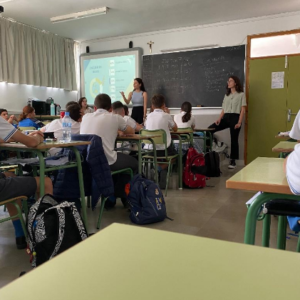News . Best Practices Participatory Research for Mental Health Promotion

Promoting mental health in schools is an urgent necessity. Data from numerous studies confirm that there has been an increase in mental health disorders among young people. Furthermore, it is also described that there is a disconnection between the academic world and society, resulting in ignorance and distrust regarding the usefulness of science in resolving societal issues. In the case of students, there is a belief that science is not for them.
The Guidance Department of CDP Juan XXIII Chana in Granada has implemented an educational project called “Healthy Minds”, within its Tutorial Action Plan, which involves participatory research with an Open Schooling approach, where the students themselves become active agents in promoting mental health. The implementation has been carried out within the framework of the European project CONNECT.
We have conducted this project with 6 class groups from 1st and 3rd year of Secondary Education (180 students and their families). Each group has worked through the sessions designed by Healthy minds, and we have implemented an action plan with various activities based on the identified mental health needs.
Firstly, we delved into the concept of health by analysing the definition proposed by the World Health Organization (WHO). Through this, we discovered that there are different types of health, not only physical but also social and mental. We analysed what they had in common and found that emotional well-being was the common term. At this point, the students identified risk and protective factors for mental health, based on which they prioritized the ones they considered most important to design and implement an action plan. Students proposed to create an “Emotional Kit” as a solution. They have suggested a set of tools to protect themselves in risky situations and promote emotional well-being. Finally, they reflected on the learning process and the impact on mental health promotion. Throughout the process, teachers and families have been involved, allowing for collaborative design of solutions.
Among the results and impact of Healthy Minds in our educational community, we can highlight a greater awareness among students of the need to focus on mental health and their ability to contribute to solving a problem that affects them through participatory research. The self-organization of students has also been promoted, and there has been a greater commitment from the school institution to improve mental health promotion. The school will start working on creating a physical space that promotes emotional well-being, which will be called the “Emotional Classroom”. Additionally, the Guidance Department will design interdisciplinary activities to promote students’ well-being in collaboration with the “Healthy habits and lifestyle” program already allocated at the school.